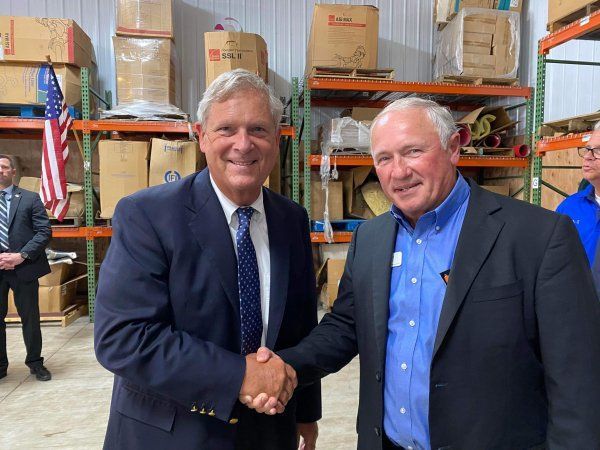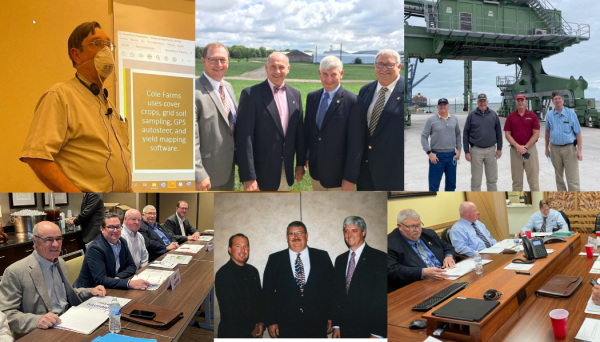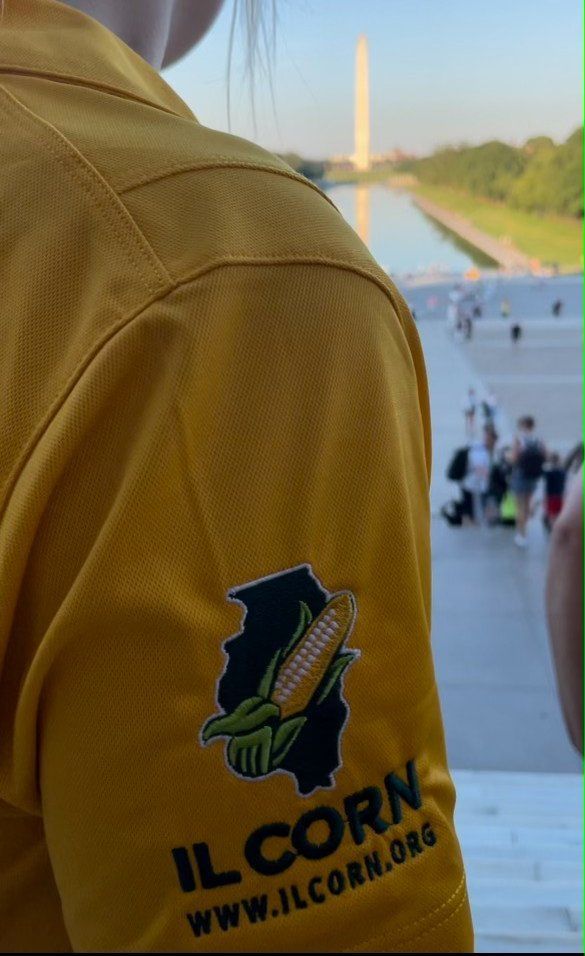Featured Article

August 23, 2022
BLOOMINGTON, Ill. – U.S. Secretary of Agriculture Tom Vilsack and Illinois Senator Tammy Duckworth met in central Illinois today to discuss corn-based ethanol and its ability to contribute meaningful solutions to our national challenges. The visit comes soon after Senator Duckworth joined as an original co-sponsor to the introduction of the Next Generation Fuels Act in the U.S. Senate. The bill establishes a new high octane, low carbon fuel standard beginning in 2026, which automobile manufacturers can use to improve fuel efficiency and reduce greenhouse gas (GHG) emissions. A clean octane standard, the bill requires that sources of additional octane result in at least 40 percent fewer GHG emissions than unblended gasoline and sets new limits on toxic hydrocarbon aromatics. Corn ethanol is an effective, low carbon octane course, providing the greatest fuel efficiency gains at the least cost to drivers while reducing GHG and tailpipe emissions. This bill finally eliminates the unfair regulatory barriers to higher blends ethanol. The Next Generation Fuels Act allows near-term, cost-effective options, as opposed to USEPA’s current path of eliminating the internal combustion engine and mandating electric vehicles. While at a visit to One Earth Energy in Gibson City, IL, Senator Duckworth said, “We see the picture of what biofuels can do and this year I took two trips into Asia and they’re really interested in gaining access to carbon neutral grown commodities (corn and soybean) and that is going to be a real advantage we have as we move forward. So, there is nothing better than American grown fuel and there’s nothing better than American grown feed. We are the fuel of the future, not just here but all over the world.” The two later visited Casey’s General Store in LeRoy, IL to see one of the many E15 fueling stations in Illinois. Casey’s has committed to including E15 options at the pump for any new facility, giving consumers a more cost-effective, cleaner choice when they fill up. “We are so grateful for Senator Duckworth’s leadership, as the Senate members can now begin to consider the role that corn-based ethanol can play in helping our nation achieve its clean energy goals. We know that ethanol has a role to play, as the cleanest liquid fuel available to consumers now with the infrastructure to truly make a difference for our environment,” said Marty Marr, IL Corn Growers Association President and farmer from New Berlin, IL. ICGA remains grateful for the leadership of Congresswoman Cheri Bustos who wrote the Next Generation Fuels Act and first introduced it into the U.S. House of Representatives in August 2021. Leadership of the bill in both the House and the Senate by Rep. Bustos and Sen. Duckworth recognizes the 40-45 percent reduction in greenhouse gas emissions of corn-based ethanol compared to petroleum fuel. Secretary Vilsack understands the important role American farmers have to play, stating, “I’m here because of terrific people here today, you are the heart and soul of this country.” ### About the IL Corn Growers Association IL Corn Growers Association is a state-based organization that represents the interests of corn farmers in Illinois, maintaining a high profile on issues in Washington, DC, and Springfield, IL. Through grassroots advocacy, ICGA creates a future for Illinois farmers in which they can operate freely, responsibly, and successfully. In order to fulfill this mission, the organization conducts governmental affairs activities at all levels, market development projects, and educational and member service programs. For further information regarding their work and involvement, visit their website www.ilcorn.org.

July 27, 2022
After Abraham Lincoln became president in 1861, he appointed to his cabinet the very opponents he had vanquished in the bitter and hard-fought battle for the Republican nomination the year before. The team of rivals, representing very different ideological positions within the GOP of the time, helped the president go on to win the Civil War, abolish slavery and keep the country intact. I thought of Lincoln’s team of rivals as I moderated a recent discussion in Washington on the upcoming farm bill reauthorization. The panel, composed of Sen. Heidi Heitkamp, former Secretary of Agriculture Dan Glickman and Richard Fordyce, who served as Farm Service Agency administrator during the Trump administration, echoed the team of rivals approach by challenging corn growers to take the lead in broadening the coalition engaged in the farm bill and fostering relationships with stakeholders outside of commodity and livestock organizations. Heitkamp used food security as an example, noting that increasingly members on the House and Senate Agriculture Committees are prioritizing domestic and international food security. She said to be successful, corn growers are going to have to build relationships with members of Congress who focus on the Supplemental Nutrition Assistance Program. “Not every congressional district has a farmer. But they do have people who need food and security assistance,” Heitkamp observed. The panelists stated that corn growers have a lot to offer groups outside the ag community, noting for example, that we have a great story to tell on helping to lower greenhouse gas emissions that could help us collaborate more with conservation and environmental organizations. Our discussion, which delved into the farm bill process and is available online , got me to thinking about how some of our recent wins were made possible precisely because we broadened our messages and worked with policymakers on both sides of the aisle. For example, our bipartisan work in Congress created an atmosphere where we could send a strong signal to the administration about biofuels having the ability to lower the skyrocketing prices drivers were paying at the pump while reducing greenhouse gas emissions. As a result, the president used his authority to extend consumer access to higher levels of ethanol through this summer. I also credit our bipartisan work for the recent win with the U.S. International Trade Commission. After months of speculation that ITC would grant a petition by a U.S. fertilizer company to place duties on nitrogen fertilizers imported from Russia and Trinidad and Tobago, in mid-July the commissioners ruled against imposing such duties .

July 27, 2022
July 31st is bittersweet for the Illinois Corn Marketing Board (ICMB) as we transition some amazing ag leaders off the board. The board terms for ICMB are 9 years but most board members give more than that. “Their commitment over decades is invaluable to the corn industry. To say their time, dedication and support to Illinois farmers is greatly appreciated is an understatement,” says ICMB chair, Mark Wilson. “These farmers represent amazing role models and it’s truly a team effort that helps us to achieve IL Corn priorities.” While some board members are finishing their 9-year terms, others have been on another IL Corn board the Illinois Corn Growers Association so are finishing almost 2 decades of being with IL Corn. The board members who are rolling off on July 31st include Roger Sy - District 12 (Newman, IL), Dirk Rice - District 6 (Philo, IL) and Dan Cole - District 9 (Plainville, IL).

July 26, 2022
In a step forward for energy security, the environment and the nation’s consumers, Senator Charles Grassley (R-Iowa), with the support of Senators Tammy Duckworth (D-IL), Amy Klobuchar (D-MN), and Joni Ernst (R-IA), today introduced the Next Generation Fuels Act in the U.S. Senate. This piece of legislation paves the way for corn-based ethanol to be an important part of our nation’s renewable energy future. Illinois Corn Growers Association President Marty Marr, a farmer in Central Illinois, made the following statement: “The Next Generation Fuels Act is a game changing piece of legislation. This bill is instrumental in helping automakers improve efficiency of vehicles, reduce CO2 emissions, and comply with stricter vehicle standards. The higher-octane fuel required in this legislation enables engines to get more miles per gallon. That increased fuel efficiency along with higher ethanol blends reduces emissions and fuel costs.” As gas prices climbed to all-time highs, ethanol has been priced about $1 per gallon less than unblended gasoline at wholesale, and drivers are saving 30 to 40 cents or more per gallon where retailers offer E15. Next Generation Fuels Act removes barriers to even higher ethanol blends giving consumers more choices at the pump. “We are thankful for Senator Duckworth’s support on NGFA. She is a leader who understands that farmers can make a large impact lessening everyone’s monetary burden at the pump while reducing greenhouse gas emissions. We would also like to thank the original sponsor Senator Charles Grassley (R-Iowa) and other supporters of the bill Amy Klobuchar (D-MN), and Joni Ernst (R-IA).”

July 21, 2022
Today, the House passed a Fiscal Year (FY) 2023 minibus appropriations package by a vote of 220 yeas to 207 nays. The package included six appropriations bills: Agriculture, Transportation-HUD, Interior-Environment, Financial Services, Military Construction-VA and Energy & Water Development (E&WD). NESP (National Ecosystem Sustainability Program) is a big win for IL farmers as $49.3 million is expected to go to preconstruction enginnering and design for LaGrange Lock. IL Corn invests in NESP in various ways including working with Congressman LaHood and Congresswoman Bustos to ask for this specific level of funding for NESP. Other highlights of the bill include: For the Investigations account , $160 million was allocated, up $17 million from FY22 and $54 million above the President’s request. Inland Projects Funded: Lower Saint Anthony Falls disposition study received $550,000 For the Construction account , $2.47 billion was allocated, an increase of $1.25 billion above the President’s request. Inland Waterways Trust Fund (IWTF) construction projects funded via the President's Budget: Chickamauga Lock funded to completion at $39.3 million Community Project Funding (earmarks) for inland waterways construction projects: $49.3 million for the Navigation & Ecosystem Sustainability Program (NESP). Funds are expected to go to Preconstruction Engineering and Design (PED) for LaGrange Lock. The Community Project Funding request was submitted by Reps. Bustos (D-IL), Graves (R-MO), LaHood (R-IL) and Luetkemeyer (R-MO) The House bill does not provide full use of the IWTF. Instead, it recommends spending approximately $31 million of the estimated $130 million in receipts during FY23, for a total of $88.6 million for inland waterways construction projects. The report states that it is the Committee’s understanding that the Corps does not have any further capability for ongoing projects. For the Operations & Maintenance (O&M) account, $5.15 billion was allocated, an increase of $580 million above FY22 levels and $2.55 above the President’s Budget. The bill provides an additional $40 million funding above the FY23 budget request for additional O&M activities on the inland waterways system. The Senate Appropriations Committee is slated to release its version of the E&WD bill before the August recess. WCI will keep our members apprised once that bill is released.

July 21, 2022
Your IL Corn Growers Association farmer leaders hit Capitol Hill last week during a fly-in to Washington, DC, our first since March 2020. A significant number of things had changed in the capitol city, but even those leave opportunities for us to connect with your elected officials and build bigger and better relationships. Most importantly, ICGA touched base with our Illinois delegation, including Senators Duckworth and Durbin. Farmer leaders brought up ICGA’s top three legislative priorities in each meeting – for some legislators there were thank yous to deliver! – and after positive conversations in a number of those meetings, we look forward to additional supporters on the Next Generation Fuels Act and additional research into Farm Bill priorities in the coming months.

July 18, 2022
Upon hearing news at the U.S. International Trade Commission (ITC) ruled today against imposing tariffs on nitrogen fertilizers imported from Russia and Trinidad and Tobago, IL Corn Growers Association President Marty Marr, a farmer from Jacksonville, IL, issued the following statement: “This is important news for Illinois corn farmers who have faced fertilizer prices more than double this year and were fearful of further increases. Tariffs would have exacerbated what was already a massive problem for Illinois family farmers. “IL Corn has talked with our elected officials about fertilizer price increases and even led our members to contact CF Industries to share the impact of the price increases on their farms. Our national association, National Corn Growers Association, even testified at an ITC public hearing. We’ve worked hard to make our voices heard and its encouraging that ITC listened.” ITC’s decision takes effect immediately. While pleased at this action and its impact on Illinois corn farmers, IL Corn continues to be concerned about consolidation in the fertilizer industry. The doubling of fertilizer prices is continuing into the 2023 crop year, stressing the profitability of Illinois farm families.

July 15, 2022
One of the key industries in the Illinois economy – agriculture – is being threatened by unnecessary tariffs on fertilizer imports and it’s driving up the cost of food. As inflation hits a new 40-year high and Illinois families feel the impact at the grocery store, it’s time for these tariffs to go. Illinois is known and respected worldwide as a significant producer of agricultural products. About 75 percent of the state’s total land area is devoted to farms, growing commodities that contribute $19 billion to the state economy. Illinois agriculture employs nearly 1 million people, doing work that puts meals on American tables and helps keep grocery prices down. Much of the Illinois ag sector’s productivity depends on fertilizers. But the cost of that key agricultural component is skyrocketing out of control. Several variables contribute to rising fertilizer prices but one that is completely controllable is the cost added by duties imposed by the U.S. International Trade Commission (ITC). In recent years, the ITC took up a request from the Mosaic Company, a giant corporation looking to increase profits by stifling the competition, and imposed a countervailing duty on imported phosphate fertilizer from Morocco. It’s an unfortunate example of crony capitalism, with government policy decisions unfairly benefiting one company over another. As always, consumers eventually pay the cost. Additionally, the ITC announced last July that it intends to impose duties on urea ammonium nitrate (UAN) fertilizer products from Trinidad and Tobago. They have begun collecting preliminary cash deposits on those imports, essentially enforcing the planned tariff before it is in place. Unsurprisingly, the ITC’s actions have caused the price of UAN benchmark product anhydrous ammonia to increase by well over 200 percent. As the Biden administration scrambles for ways to rein in rapidly rising consumer costs for food and other essentials, you would think repealing these tariffs would be at the top of the list. A number of U.S. House members and Senators certainly think it’s a good idea. More than 80 of them recently sent a letter to the ITC, pointing out that reversing these tariffs would be an immediate way to at least partially remedy the high cost of fertilizer for farmers and, in turn, the retail cost of the food those farmers provide. Several representatives from Illinois signed the letter, including Rep. Cheri Bustos. Tariffs have the same effect as taxes; they increase production costs and consumers ultimately suffer the consequences. Morocco and Trinidad and Tobago are longtime U.S. allies and valued trading partners. There is no legitimate reason to punish them with tariffs that, in the long run, hurt American farmers and families. Let’s hope all members of Illinois’ congressional delegation stand up for our state’s agricultural community by speaking out against the tariffs.
Articles
2026
2025
2024
2023
2022
2021
2020

